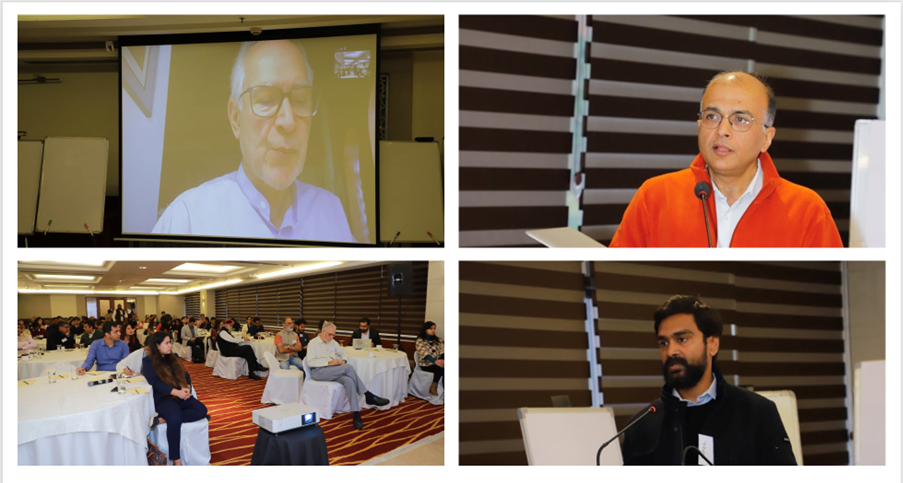 Annual Work Planning Workshop 2023, at India Habitat Centre, New Delhi
Annual Work Planning Workshop 2023, at India Habitat Centre, New Delhi
To build the climate narrative for the year 2023, Shakti conducted its Annual Work Planning Workshop on January 24 and 25, 2023. This workshop is a congregation of experts from various sectors to collectively brainstorm and deliberate on critical challenges and barriers confronting sectors relevant for climate action and to ponder upon and conceptualise interventions and solutions.
The annual convening on ‘Building the Climate Narrative for 2023’ hosted by Shakti Sustainable Energy Foundation in New Delhi generated robust discussions with various stakeholders to find solutions for a more sustainable future. It was a remarkable opportunity for stakeholders to share their learnings, exchange ideas and explore collective approaches towards solutions for common challenges. It paved the way for creating a clear roadmap for building the climate narrative for the coming year.
Delivering the opening remarks at the inaugural session of this convening, Mr Jamshyd Godrej, Board Chair, reiterated Shakti’s commitment towards working with stakeholders on shared goals. He spoke about how there is now a greater understanding about the role of philanthropy and how India is being seen as an important place where more money can make a difference. CEO, Dr Anshu Bharadwaj, emphasised that in the light of India’s new climate commitments, the focus is on an economy-wide transition where energy is an important focus but not the only one.
The two days of the workshop were replete with insightful discussions about various sectors and the interventions required that will equip them to support India’s climate journey. Some of the key commitments of India are reducing the emissions intensity of its GDP by 45 per cent by 2030, from its 2005 levels; achieve about 50 per cent cumulative electric power installed capacity from non-fossil fuel-based energy resources by 2030, with the help of transfer of technology and low-cost international finance; and enhancing the mitigation and adaptation in India by increasing access to domestic and international finance mentioned in the updated NDCs. These commitments were central to Shakti’s work planning sessions that sought to identify how philanthropic, civil society and private sectors could support the realisation of these NDCs.
This year, there were ten programme areas of focus at the Work Planning Workshop.
Steel Decarbonisation
The industrial sector can contribute significantly to reducing India’s emissions, with the steel industry playing a major role in adoption of new technologies to reduce emissions and improve efficiency. The session on Steel Decarbonisation deliberated and analysed the required actions for steel industry to decarbonise and policy directions that can support steel stakeholders in their transition towards decarbonisation.
Buildings Decarbonisation
An energy intensive sector in India is the buildings sector. Since urbanisation is expected to increase in the coming decades, measures are necessary to help the buildings sector avoid embodied and operational emissions. The emphasis of the Buildings Decarbonisation session was on challenges and barriers that must be vanquished to be able to create an enabling environment for net zero buildings.
Sustainable Energy Technologies and Fuels
In the backdrop of the fact that clean energy technologies are central to operationalising the net zero transition, the session on Sustainable Energy Technologies and Fuels concentrated on identifying the course of action for scaling up key technologies such as Offshore Wind and Carbon Capture and Storage and technology and finance barriers to overcome for these to be successful.
Distribution Reforms and Power Markets
At the Distribution Reforms and Power Markets session the priority was on understanding and conceptualising strategies for providing the required support to the power sector, the highest emitting sector in India, in its transition to cleaner sources of energy. The institutional factors to be considered in facilitating a smooth and efficient transition was also an important area of deliberation.
Energy Access for Development
Access to clean energy is significant in the country’s developmental agenda as it can result in increased labour productivity, enhanced agricultural efficiency, and improved livelihoods. The session on Energy Access for Development focused attention on areas where Decentralised Renewable Energy (DRE) solutions can have the highest impact and business models and policy landscape required to support DRE scale up across the country.
State Level Climate Action
Sub-national actors play a key role in implementing the climate targets set by the Central government. So, it is imperative to concentrate on the challenges faced by these stakeholders and find solutions to support them in the successful implementation of climate actions. This was the theme of the sessions on State Level Climate Actions and Cities and Climate Action which undertook a deep dive into bottlenecks faced by sub-national actors in the climate action journey and tactics and initiatives to help them overcome these obstructions.
Agriculture
The main focus of the session on Agriculture was to gain insight on methods to support the agriculture sector to improve resilience to climate impacts while parallelly improving livelihoods of those who are dependent upon it and also reducing emissions from the sector.
Sustainable Marine Resource Management
Ocean-based mitigation strategies can play a significant role in capturing emissions and increasing community resilience to climate change impacts on India’s coastline which is extremely vulnerable because of rising sea levels and ocean acidification impacting livelihoods of the coastal communities. This was the issue discussed in the session on Sustainable Marine Resource Management which sought improved knowledge of the ecosystem to discern ways in which coastal interventions can support India’s climate ambitions.
Climate Resilient and Adaptation Financing
The impacts of climate change can be felt across the country, with maximum ramifications for the vulnerable communities. Measures to help these communities to improve their ability to adapt to climate change are critical. A key challenge here is the inadequate financing available for these adaptation. Overcoming financing challenges is crucial for increasing adaptation and resilience interventions in India. The Climate-Resilient and Adaptation Financing session concentrated on exploring strategies for increasing financial flows for adaptation and resilience to support these communities.
